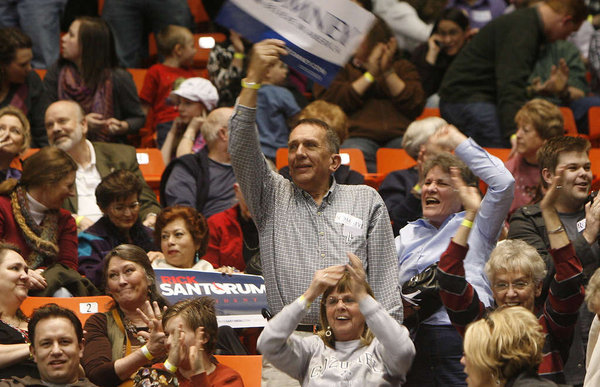Philadelphia Inquirer – March 9, 2012
Mitt Romney’s travails in the Republican primaries and President Obama’s constant sparring with Congress have helped my students appreciate how hard it is to stick to your guns if you’re trying to lead either of the two main political parties. Succeeding at “big tent” politics requires a sense of timing and flexibility. Some may call the latter “flip-flopping,” but only when their opponents do it.
Caucus-goers in Boise, Idaho. Mitt Romney won there and in five other states this week as the struggle within the GOP’s “big tent” continued.
Considering historical examples, the class decided no president or presidential candidate ever played this game for higher stakes, or better, than Abraham Lincoln. 2012 happens to mark the sesquicentennial of Lincoln’s unveiling of a preliminary Emancipation Proclamation, which was a prototype of big-tent politics.
The president had avoided directly confronting slavery while in office, but increasing pressure from abolitionists, the need for a greater Union cause, and concern that Britain might side with the Confederacy finally spurred him to act. The preliminary Emancipation Proclamation was issued in September 1862, shortly after a Northern victory of sorts at Antietam.
The first time my students read this very brief document, they took it to be what the title suggests – a freeing of the slaves. After a second look, though, they noticed that only the slaves in states “still in rebellion” were declared free as of Jan. 1, 1863. And, as one student pointed out, Lincoln had little power to free slaves in states outside his control. After a third read, it dawned on the class that, as one student put it, “This is an offer to the Southerners to keep their slaves if they end the rebellion by January 1st, 1863.”
They looked at each other. That couldn’t be right: This was the Emancipation Proclamation. Yes, and this was big-tent politics – little steps toward big goals.
Black leaders in the South understood exactly what Lincoln was doing. Two years later, a group of them discussed the war and the future of “the colored people in the rebel states” with Union Gen. William Tecumseh Sherman. Their spokesman, Garrison Frazier, who had been a slave until 1856, voiced his understanding of the proclamation: that if the Confederates “would lay down their arms and submit to the laws of the United States before the 1st of January, 1863, all should be well; but if they did not, then all the slaves in the rebel states should be free henceforth and forever.”
The proclamation was phrased so that the fate of the slaves appeared to be in the hands of their rebel owners. Many abolitionists were angry that Lincoln had not gone further. Frazier and his colleagues were realists, however, and they knew that the president’s loyalty was to the Union, not to them.
The Emancipation Proclamation did not directly free any slaves on Jan. 1, 1863, but it did change the focus of the war. What had officially been a struggle to preserve the Union also became a crusade to end slavery.
Lincoln’s death secured his status as “the Great Emancipator” while others were left to sort out the legacy of slavery, including the legal status of the “freedmen.” Ironically, his immediate successor, Andrew Johnson, failed so utterly as a big-tent politician that he was impeached by his own party in the aftermath of the war. Romney’s problems pale in comparison.



There is no big tent. We have been separated into those who pay for everything and those who live off of the people who pay everything. It cannot be bridged.
There are those in the big tent, and those that pay for it.
Dear Grant:
I just read your terrific piece in this morning’s Inquirer about the political dilemmas of Emancipation. We met a few years ago, thanks to the great Linda Wasserman! I attended FCS a million years ago – well, OK, class of 1971.
Your essay gave me an idea.
My co-author Murray Dubin and I have had wonderful responses from high school audiences when we give talks on our 2010 book, Tasting Freedom: Octavius Catto and The Battle for Equality in Civil War America. (www.TastingFreedombook.com ) We did that one reading at FCS back in 2006, before the book was complete. But I would love to do another and feel overdue to give something back to a great school.
We could help FCS mark the 150th anniversary of Emancipation. A passage in our book describes how black churches in Philadelphia and across the North filled up on “Watch Night,” Dec. 31, 1862, to await word of whether Lincoln had signed the proclamation. Then there is the moment at Port Royal in Union-occupied South Carolina when the word reaches soldiers and freedmen there (along with their Quaker teachers from Philadelphia) and they begin singing “My Country ‘Tis of Thee.” Every schoolkid should know that scene! Not to mention – all the young Americans, black and white, who played frontline roles in that era’s struggles for freedom and equal rights. We love sharing those passages with young readers.
Dan Biddle ’71
Sounds great! Let’s see what we can do.
Dear Grant,
Thanks for your interesting discussion of the Emancipation Proclamation and the theme of “big-tent politics.” I think I learned a thing or two about Lincoln and his conception of the Union. I would only add, however, my suspicion that the South could not have come back into the Union with the slave system in place. I don’t believe this would have worked, since a significant part of the North-South conflict was about two competing social-economic systems, and I don’t believe that the southern system was viable in the long term. The point was expressed, in degree, in the vehemence of the Northern abolitionists.
In spite of those doubt, I still see a good deal of good sense in the theme of big-tent politics. I believe that we do better with less–polarization and less polarization of out major political parties in particular. We are now, perhaps, on our way back in that direction, and a key element is the need of tolerance and humanity regarding people who may disagree with us on particular issues or policies. That seems to be something much needed on both sides of the political spectrum, and in order to facilitate broad, inclusiveness in the parties.
A connected phenomenon of which I have long been aware is a near visceral fear of ideas, (and I would add, some considerable tendency toward persecution of philosophers as agents of ideas and their evaluation). In a way, of course, this is a recognition of the genuine power of ideas, but in a very backhanded fashion. To move toward big-tent configurations, we have to remove this fear of ideas and make the open discussion of them fashionable again–in contrast with the practice of seeing to it that certain favored ideas prosper by eliminating the competition from our various forums of discussion.
Howard
If only you were a representative reader. Our culture and politics would be in a very different (better) place.
You make excellent points. It’s so hard to know what was clear to people in 1861 before the storm really broke and what could have happened or not, but I tend to agree with you that Lincoln did not expect the South to accept his offer to return to the Union and keep their slaves, nor did he imagine slavery could continue much longer.
Part of the tragedy of the struggle was that many Americans, including many Southerners, felt that slavery was wrong and must be ended, but they had no idea what came next. Even Lincoln didn’t seem to believe that an integrated, multi-racial society was possible.
Lincoln’s second inaugural is an impressive piece. Taking nothing away from the awful pressures Obama faces every day, it’s difficult to imagine arriving at your inauguration with several states already having left the Union and more to go, knowing that your election precipitated their breaking away and fearing a civil war of some sort was in the making, but having no concept of the scale of the catastrophe that was looming. Puts worrying about the unemployment rate in perspective.
If you don’t already know it, take a look at the following address by Douglass:
http://teachingamericanhistory.org/library/index.asp?documentprint=39
Douglass seems to demonstrate that Lincoln could not have accomplished what he did without a kind of “big-tent” politics–much wider in appeal than the call of the abolitionists.
At the same time, Douglass makes no criticism of the abolitionists by saying this. Their advocacy was perhaps as crucial to the results as was Lincoln’s focus on saving the Union. (A colleague mentioned this piece to me just last night.) This piece is very typical of Douglass–hard as nails, appreciative where it is due, always clear headed.
Thanks for the Douglass link.
I’m a huge fan of his. As you say, can’t think of any figure in American history who saw things as clearly in their time as he did in his. And none who were more willing, as the Quakers like to say, to speak truth to power.
I couldn’t agree more. Douglass’ writings are so valuable, partly because he had so few illusions regarding American society. We had included a famous piece of his in our American Ethics source book, UPA, 2000 (along with the 1680’s protest of the Germantown Friends, by the way).